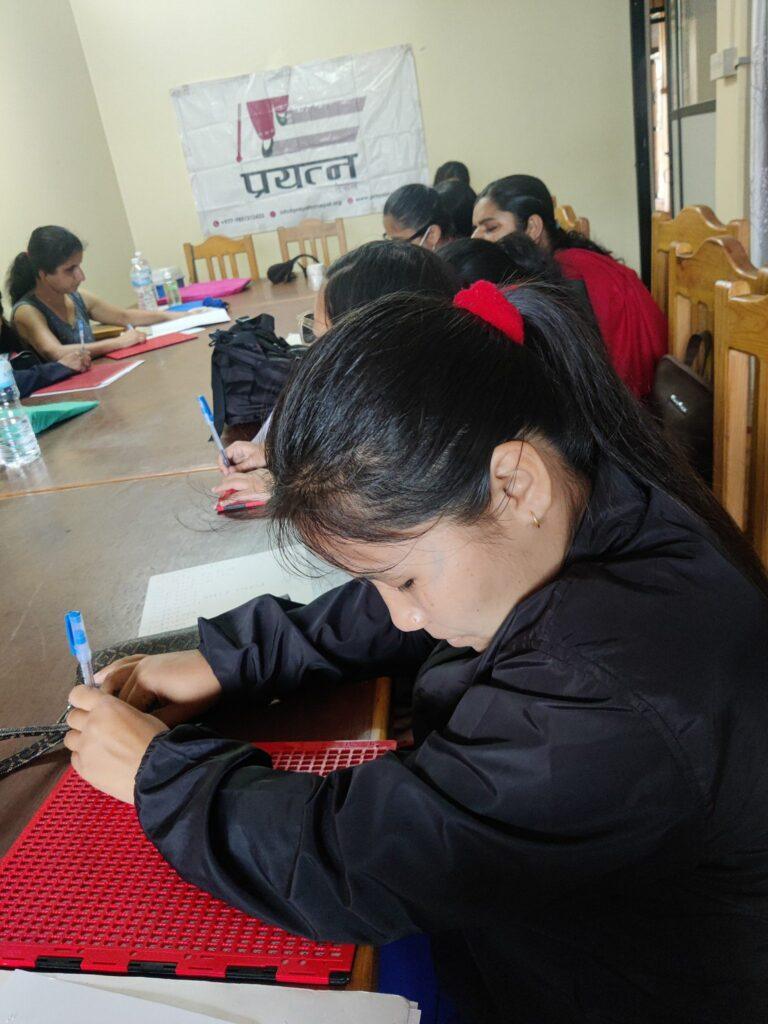
Prayatna Nepal is the self-help organization, which is working continuously to empower the living condition of women and girls with visual impairment. The organization is established by the group of both women with and without visual impairment. Among the seven board members, five (71%) are with visual impairment, including the chairperson. The idea of inclusion of women with and without disabilities in the organization is to make equal efforts from every individual with better understanding to improve the social, cultural, economic, environmental and political life of women with visual impairment.
With the aim to reduce the fingerprint and enable signature writing, Prayatna Nepal organized 3 days signature technique training for 17 blind girls and women. The objective of the training was to sensitize blind girls and women on the structure of sighted alphabet and develop their own signature and eliminate the use of fingerprint. Ms. Sarita Lamichhane, chairperson of Prayatna Nepal facilitated the opening session of training. She welcomed all the participants and invited Mr. Shrikanta Sapkota, chairperson of Kaski Association of the Blind, who highlighted the objectives of the training along with the introduction of Prayatna Nepal. After thanking Mr. Shrikanta, she requested all the participants and representatives from Prayatna Nepal to introduce themselves. During the introduction round, participants shared their expectation of training. Along with their introduction, the participants reflected upon their own experience and challenges of not being able to make their own signature. They also shared that they use fingerprint in banking and other documents where they need to do their signature. Due to this, they are not able to acquire bank checks or ATM cards which has hindered their financial independence. After this, Ms. Sarita handed over the floor to the facilitator of the training, Ms. Sabita Lamichhane, who explained about the training module. The training began with participants jotting down the formula of each English alphabets A-Z in their braille paper using slate and stylus. They then started practicing the alphabet following the given formulae. Ms. Sabita Lamichhane along with Ms. Ritu Pant, Senior Program Coordinator of Prayatna Nepal, guided the participants to learn the formulae of the alphabets. They were consistently given individual attention while practicing and working on the alphabets. In this way, the first day of the training came to an end with the participants feeling relatively confident in following the formulae and independently writing the alphabet A to Z. On the second day of training, Ms. Sabita along with Ms. Ritu’s support guided the participants to write letters with a pen using the slate board. After learning to write using pen through a slate board, they were given a signature guide to practice writing their names on a paper. A signature guide is a wooden square with a small writing space that enabled the participants to write in straight line without using slate board. This practice occurred throughout the day while Ms. Sabita and Ms. Ritu guided them continually. Prayatna Nepal team observed that learning is not the same for all so they used different methods of guiding catering to the individual needs / problems of the individual participants. Some participants required constant guidance and supervision while some were able to perform more independently with minimal support. In this way, the second day of the training ended with continuous practice. The third day was the continuity to the second day of the training where the participants were involved in practicing writing their names using signature guide. They were given constant instructions and supervision, which finally helped them be able to write their names independently with and without slate and signature guides. Some participants were able to write their full names by the end of the third day while some chose to write their first names only. However, there were few participants who felt more confident in writing the initials of their names. As per their individual confidence and ability, they were supported and guided accordingly. Hence, at the end of the third day, Ms. Sarita Lamichhane proceeded to close the training. For this, she initially took feedback from each participant. The participants expressed their gratitude towards Prayatna Nepal team and suggested to provide refresher trainings following this training to eradicate the fingerprint completely. Then, she handed the floor to Mr. Khom Raj Sharma, chairperson of NFDN Gandaki Province for closing remarks. He thanked the participants for their enthusiastic and positive learning attitude towards the training. Additionally, he mentioned that practicing what they learnt is the key to eradicate fingerprints completely. He then ended his speech by encouraging everyone to continue their practice for better learning outcomes.


